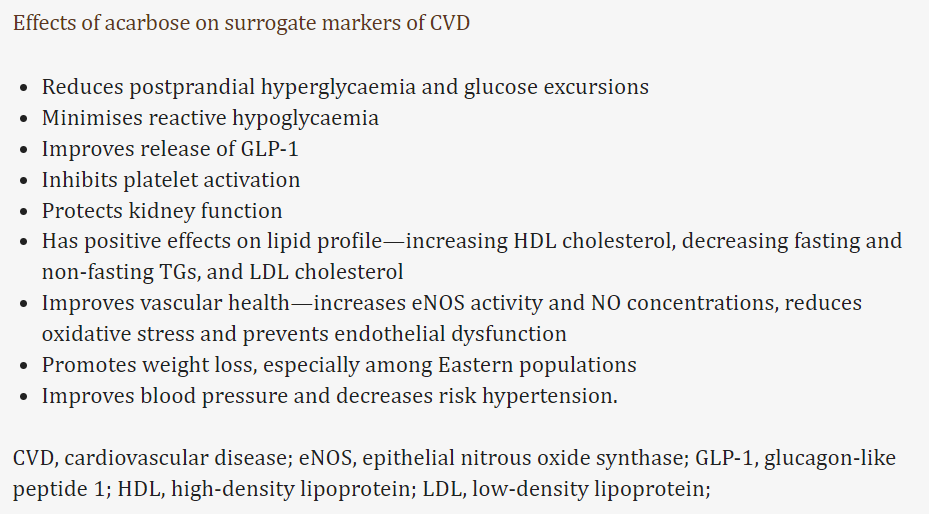Yes, acarbose does not have much effect on the A1C, but it is the glucose spikes AND the triglyceride spikes that do the damage.
Acarbose has other lifespan/healthspan properties in addition to controlling glucose spikes.
I was unaware of the lipid-lowering effects. Some of the effects that I attributed to pantethine may have been due to acarbose. In any case, my lipids have been at an all-time low since I started these two supplements.
I initially was not a big fan of acarbose, mainly because of the effect it had on my digestive tract and the bloating and gassiness it produced.
As RapAdmin pointed out, by reducing or eliminating grains, especially wheat from the diet, most of the bad effects will go away. Since I have switched to a very low-carb diet the side effects have completely gone. Even though my diet alone eliminates any but the most minor glucose spikes after a meal, I still continue to take acarbose because it also eliminates lipid spikes.
This is from one of the best reviews of acarbose that I have come across. It references Meta, Cochrane, and other systematic reviews.
“The beneficial effects of acarbose therapy on serum lipids have been well described. Initial research by Hillebrand et al,81 from a double-blind crossover study, showed that acarbose has a dose–dependent effect for reducing postprandial total triglycerides, with a 200 mg dose being the most effective.”
I think most people taking acarbose are unaware of its lipid-lowering effects.
“There was a 26.8% decrease in mean triglycerides among the acarbose group, compared to 9.2% in the metformin group, and an 8.8% reduction in the placebo group. The LDL-C level increased by 5% in the placebo group, but was reduced by 21.8% with acarbose treatment, and remained unchanged with metformin treatment (p=0.0065 for acarbose vs placebo”
“Acarbose has also been found to improve vascular health and also likely has antiplatelet effects. Lastly, acarbose has been shown to provide euglycemia, partially by increasing GLP-1 levels and blunting postprandial spikes of glucose and lipid levels.”
Euglycemia a noun:
"The condition of having a normal concentration of glucose in the blood; good glycemia regulation; good glycemia.
“Also, these authors showed that acarbose further potentiates the postprandial reduction of ghrelin, thus suppressing appetite”
“Acarbose: safe and effective for lowering postprandial hyperglycaemia and improving cardiovascular outcomes”
Review: Acarbose: safe and effective for lowering postprandial hyperglycaemia and improving cardiovascular outcomes - PMC.

